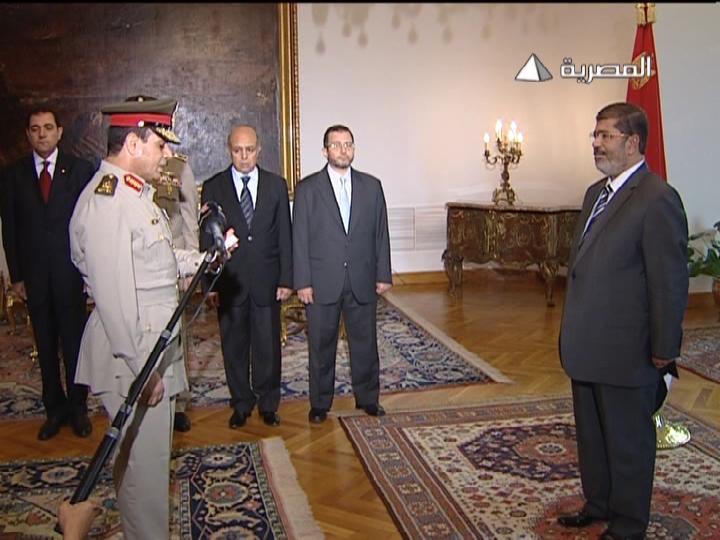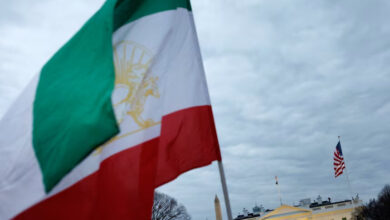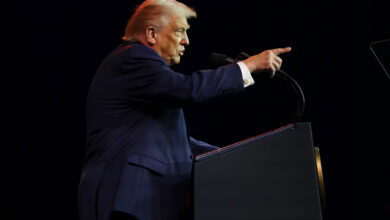
As the Armed Forces spokesperson concluded the General Command’s statement announcing the removal of Mohamed Morsy from the presidency, a step taken in response to popular demands voiced during the 30 June protests, countries around the world delivered statements clarifying their stance on the issue. News of Morsy's ouster drew mixed reaction at the domestic level, with some deeming it the people's will, and others describing it as a violation of constitutional legitimacy.
In Arab countries, reaction to the news was divided into three categories: outright approval, wariness towards the unfolding events, and complete rejection. Qatar voiced reservation to Morsy's removal before exhibiting an understanding of the new reality in Egypt. Oman also maintained its unbiased foreign policy on Arab issues. Apart from these two nations, the Gulf states, especially Saudi Arabia and the United Arab Emirates (UAE), were the most welcoming to the developments in Egypt. This was embodied in pledges by Saudi Arabia and the UAE to reinvigorate the crisis-hit Egyptian economy with billions of dollars in aid packages. It is noteworthy that both kingdoms were originally against the 25 January revolution due to their fear that the uprising would extend to their shores and because of their traditional sensitivity and uneasiness regarding the political ascent of the Muslim Brotherhood.
Sudan, Egypt's southern neighbor, declined to comment on the situation in Egypt, arguing that this was a domestic issue. The Sudanese leadership, intellectually close to the Muslim Brotherhood, believed that declaring its position would harm its ties with the most important country in the Middle East and Africa. The government in Sudan declined to support the change in Egypt so as not to bestow legitimacy to the opposition at home, where the National Umma Party has been leading a campaign to collect signatures for President Omar al-Bashir's removal.
As Egypt and Tunisia have undergone similar experiences, with both having had massive uprisings that brought to power Islamists in the place of the old regimes, the events in Cairo could have repercussions in Tunis's tense political scene where, similarly, Islamists and secularists are at loggerheads. Hence the Tunisian government's rejection of the developments in Egypt and its accusation that what had taken place was a military coup. The government is obviously wary of a similar scenario occurring in their country, especially after the launch of a Tunisian Tamarod campaign, a copycat movement of Egypt's activist group.
In Africa, the African Union (AU) has had the boldest international reaction, suspending Egypt's membership in protest of what it suggested was an unconstitutional power grab. But the AU’s measure was to be expected given Africa’s historical sensitivity to military coups. The AU's Lome declaration in 2000 stated that the organization rejects all instances of unconstitutional change of government, including military coups and armed rebellion. Egypt, for its part, believes that the declaration failed to consider special cases where regime change occurs through “legitimate” popular revolts.
Non-Arab, Islamic states objected to the events in Egypt. Turkey also labeled the developments a military coup. This reaction can be traced to the amicable relations between the Muslim Brotherhood in Egypt and the Islamist-oriented government in Ankara. Turkey, also naturally sensitive towards army intervention in politics, believes that the situation in Egypt will stoke tension, enable the army to return again to power and, therefore, hinder democracy.
The army intervention was deemed unacceptable by Iran, which is logical given Iran's welcoming of the 25 January 2011 revolution, which removed the hostile, pro-Washington Mubarak regime. Tehran had also welcomed the revolution for bringing Islamists to power, something it believed represented an extension of its own Islamic Revolution. Another reason for this reaction is that the Muslim Brotherhood does not oppose rapprochement with Shia Iran, at least on the political level. Removing the Brotherhood could push Iran back into a state of regional isolation, especially as the downfall of al-Assad's regime in Syria is a real possibility.
Major world powers also gave mixed interpretations to the developments in Egypt. Most notably, the United States' reaction to the 30 June events was confused and hesitant, much like it was during the January 2011 uprising. The US reaction to the Armed Forces statement was, arguably, driven by pragmatism. While the US expressed deep concern for the army’s decision to suspend the constitution and remove Morsy, it declined to label the step as a military coup. Washington, used to adapting to changes in Egypt, demanded a speedy, responsible return to civilian, democratic rule.
Israel initially avoided commenting on the situation in Egypt, before Prime Minister Benjamin Netanyahu hinted that his country was “an island of stability and democracy, in a sea of instability and despotism.” Although he did not explicitly give his opinion on the developments in Egypt, his statement stressed that Israel’s top concern, regardless of who rules in Egypt, is to preserve its security and stability by maintaining the peace treaty it has signed with Egypt.
Morsy's overthrow also stirred varied reactions in Europe. While Germany said the army’s decision was a “setback for democracy,” France said it supported popular demands and declined to describe the development as a military coup. Britain said it does not believe military interventions should be a means to solve disputes in democratic countries.
Non-Western states' reactions were predictable, with Beijing stating that it respects the choice of the Egyptian people, which is typical of its foreign policy which prioritizes national goals and tolerates a shifting of stances on any issue.
Moscow's response was consistent with the fundamentals of its policies, which do not condone intervention in other nations' domestic affairs. Moscow was neutral to the 30 June events and only urged self-restraint. However, removing the Muslim Brotherhood from power was likely to have been secretly welcomed by the Russian leadership, as the Russian Supreme Court has banned the group and defined it as a terrorist entity.
The author is a Political Researcher at Almasry Studies and Information Center (ASIC). The analysis was written in Arabic and was translated by Mohamed Mostafa.




